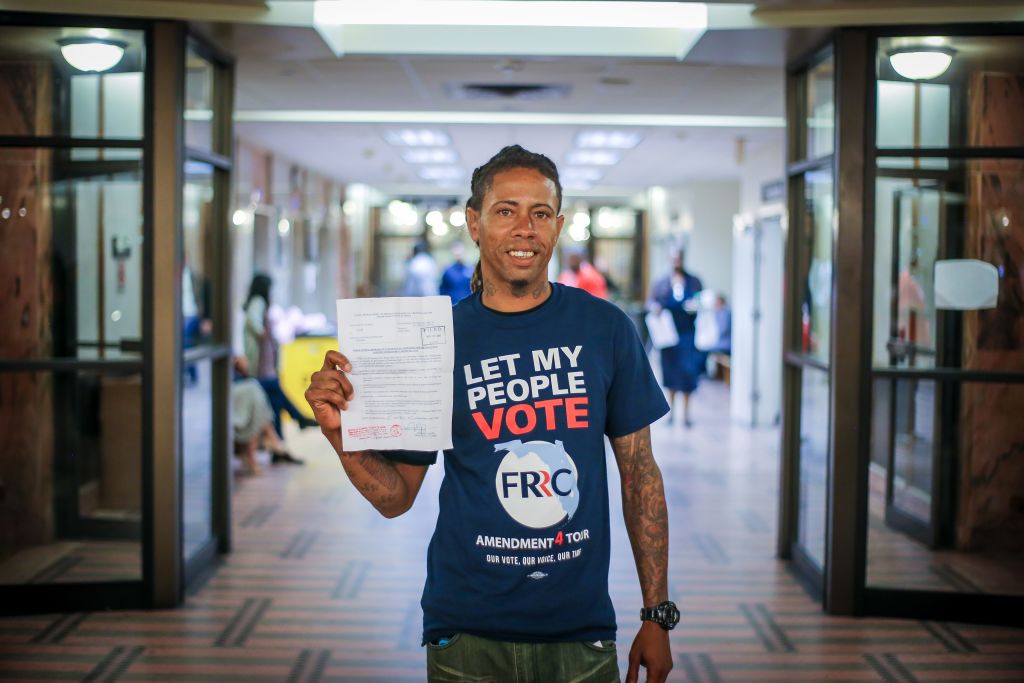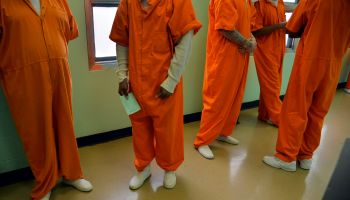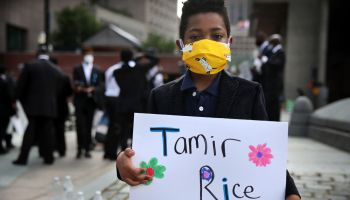
Michael Monfluery, 38, who has never been eligible to vote, stands in a courthouse corridor following a special court hearing aimed at restoring the right to vote under Florida’s Amendment 4 in a Miami-Dade County courtroom on November 8, 2019, in Miami, Florida. | Source: ZAK BENNETT / Getty
On Sunday, May 19, the organization I lead, Building Freedom Ohio, convened 450 formerly convicted persons to raise awareness of collateral sanctions. The gathering, which was held in Cleveland, was an outgrowth of organizing among persons with felony convictions who want to be recognized as full members of society. Few people know our story. And even fewer people understand how our stories connect with theirs.
What are collateral sanctions?
When a lot of people hear about incarceration, they wonder why a person was incarcerated. Many are unaware of the difficulty in moving past the crime, for which one has served time. Collateral sanctions, also called consequences, are the continued punishments after one has completed incarceration, paid fines and fees, and fulfilled all requirements of probation and parole. Once a person has a felony on their record, they face a lifetime of consequences, and it doesn’t matter how long they have been free.
Our ancestors fought for full liberation, and this is a battle we continue to wage today
Most people don’t know this unless they know someone who has been incarcerated or served as an ally for an incarcerated person during their attempts to find housing and work. If a person hasn’t been in this situation, known someone in this situation, or worked in criminal justice, they likely wouldn’t know the difficulty of being reintegrated back into society. The truth is that even in the best of scenarios, post-incarceration brings physical freedom but psychological prison. That’s because incarceration is merely one step in a series of punitive steps designed to forever punish persons who have made mistakes.
The effects of collateral sanctions
It is regrettable that individuals with felony convictions continue to face significant barriers and restrictions due to collateral sanctions. To put it another way, collateral sanctions are the policies and practices that impose additional penalties on formerly incarcerated persons and their families. They include restrictive parole, restrictions on where a person can live and work and restrictions on the type of education funding one may receive. These policies create a cycle of perpetual punishment that formerly incarcerated persons can never truly overcome. I’ve heard of persons obtaining law degrees while in a carceral system but being unable to practice law upon their release due to a prior felony conviction.
What you must know and appreciate is that collateral sanctions don’t make us safer; that’s a claim made by their proponents. To create safe communities, we must create a sense of belonging and connection for all people in that community. Othering certain individuals ostracizes them and sets them and the community up to fail. We need to know one another and believe that there is space for us all.
It’s like maintaining an aspect of slavery
If you’ve never been to prison or loved a person with a felony conviction, you may think that you need not focus on this issue. But collateral sanctions impact every single one of us. They reduce community resources and limit all members of the community from fully participating. They also create a sense of shame among the system-impacted person and their family. Collateral sanctions fuel cycles of poverty and recidivism. In Ohio alone, more than 1 million individuals live under collateral sanctions. If a person is unable to obtain gainful employment, everyone suffers – the individual, the individual’s family and the local economy.
What is considered a collateral sanction?
The first step in addressing this is understanding what is considered a collateral sanction. When most people think of collateral sanctions, they think of restrictions on voting. And I understand why. In 2022, 4.4 million Americans were barred from voting due to a felony conviction. And 48 states have laws that place some type of restrictions on voting rights. While the right to vote is critical in a democracy, losing the right to vote due to a felony conviction is merely one form of post-release punishment. But a person with a felony can also be barred from obtaining certain types of occupational licenses.
The bottom line is our communities, indeed our democracies, would be better off if all community members were included. Maintaining draconian and overly punitive restrictions on formerly incarcerated persons is like maintaining an aspect of slavery. And understanding the evil of the institution of slavery, we should be ready to part with it for once and all.
As our nation was moving away from the atrocity of enslavement in 1865, there was understandable excitement and relief. But there was a snag; the 13th Amendment to the U.S. Constitution ended slavery except as punishment for a crime. As of Nov. 2022, four states – Alabama, Louisiana, Oregon and Vermont – still allow slavery as punishment for a crime. It is not a stretch to say that there has always been a financial incentive to maintain slavery as punishment for a crime. And rising rates of mass incarceration prove this belief. While there has been a lot of data on the cost of mass incarceration and the injustice of harsh punishment, we also need to be focused on collateral consequences.
Post-incarceration brings physical freedom but psychological prison
Many states, including Ohio, allow “civil death.” Civil death means a formerly incarcerated person is rendered powerless under a host of penalties and sanctions. We know our ancestors fought for full liberation, and this is a battle we continue to wage today.
I may be the first formerly incarcerated person you encounter. I may be the first person to outline the harms of perpetual punishment. What matters now is what you do with the information I’ve shared. Will you use it to make our communities better or turn away in search of the status quo?
Fred Ward is the director of Building Freedom Ohio, a project of the Ohio Organizing Collaborative
SEE ALSO:
Race Forward Shines A Light On The Plight Of Incarcerated Women
How The Black Southern Women’s Collaborative Is Giving ‘A Voice To The ‘Purposely Ignored’
























